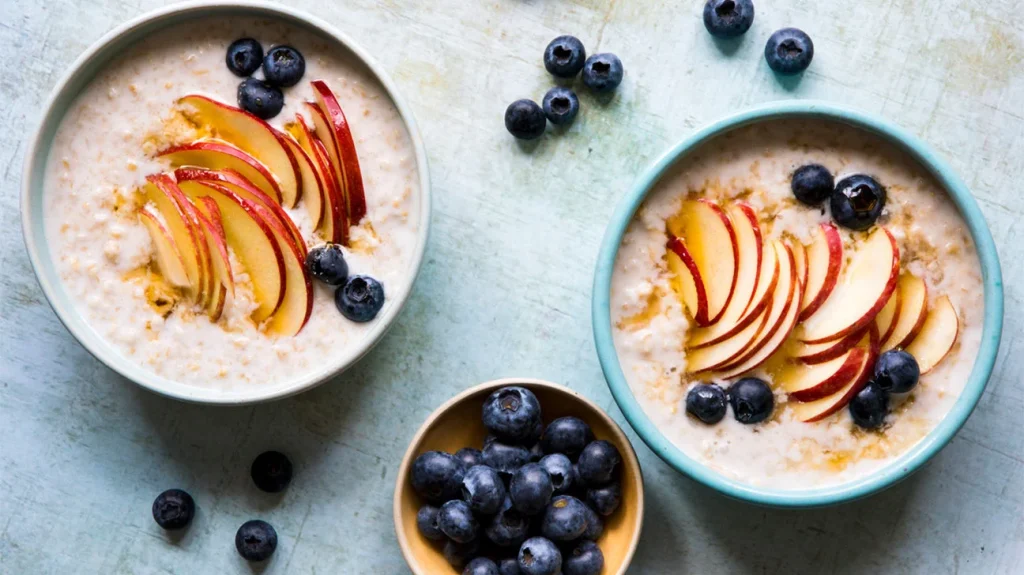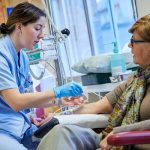
You can help yourself to get ready for cancer treatment by trying to eat a wide range of foods in the right proportions, also called a varied diet. This includes eating enough protein, calories and other nutrients.
Eating a varied diet is one part of prehabilitation. This is a programme of advice and support that can help to prepare you for treatment. The other parts are being physically active and looking after your mental wellbeing.
Focusing on these three areas, in whatever time you have before treatment starts, can help you:
- feel more in control of your health
- cope better during treatment
- recover better
And by making it part of life with cancer, it can help you to live well in the long term.
Understandably you might be going through a lot when diagnosed with cancer. Focusing on these lifestyle changes might sound overwhelming. Everyone will have different needs and abilities, so do what you can and be kind to yourself.
Don’t hesitate to ask your healthcare team for advice – they will want to help you during this time.
What foods should I eat?
You should try to eat a varied diet. This means eating a wide range of foods in the right proportions. It also includes drinking plenty of fluids. Doing this can help you to achieve and maintain a healthy body weight. But this doesn’t mean you can’t allow yourself the occasional treat.
Following a cancer diagnosis, you might go through a period of uncertainty and anxiety. This can lead to a loss of appetite and weight. Try to continue eating if you feel like this, following the advice on a varied diet.
So, divide your plate at each meal as shown below. Each slice shows how much of a food group should be on your plate.
You should try to eat:
- protein – for each meal try to eat the same number of grams of protein as half your body weight in kilograms. So if you weigh 60kg, you should have at least 30g of protein per meal, three times per day. Protein is important to build muscle and in preparation for surgery. Beans, pulses, tofu, fish, meat and eggs are examples. Limit the amount of processed and red meat you eat.
- fruit and vegetables – eat at least five portions per day. You should aim for 2 to 3 spoonfuls of vegetables, 1 medium piece of fruit, 2 smaller fruits like plums or clementines or a handful of grapes or blueberries
- starchy carbohydrates such as potatoes, bread, rice, and pasta, choose wholegrain versions
- dairy products such as milk, yoghurt and cheese – choose low fat versions unless you are underweight or use non dairy alternatives that have added calcium
- some oils and spreads high in unsaturated fat
Drink six to eight glasses of water, low fat milk or sugar free drinks, including some tea and coffee. Limit fruit juice or smoothies to 150ml per day.
Avoid alcohol as much as possible or drink no more than 14 units a week. Spread it over at least three days.
How does eating a wide range of foods in the right proportions help?
A healthy weight
Eating a varied diet, together with being physically active, can help you to keep to a healthy weight.
Weight problems are common for people with cancer. This could mean being either underweight or overweight at the time of diagnosis or after some cancer treatments.
Being underweight at the time of diagnosis can affect how well you cope with and recover from treatment.
Being very overweight or obese in the long term is also linked to developing 12 types of cancer. This is why it is important to take control of your diet and your weight before your cancer treatment and afterwards.
Recovery from treatment
Eating a varied diet can help you to:
- cope with treatment side effects
- handle the best dose of certain treatments to treat your cancer
- recover and heal faster
- fight off infections
- feel less fatigued, stronger, healthier and have more energy
If you have diet problems
Some people waiting to start treatment or living with cancer can have diet problems. These include:
- taste changes and loss of appetite
- weight loss
- difficulty swallowing
- digestion problems
- cachexia (wasting syndrome)
- not enough fluid in the body (dehydration)
What you can do
There are small steps you can take to eat a more varied diet:
1. Keep an eye on your weight
- Use a scale to weigh yourself. Report any dramatic weight changes to a health professional.
- If you are worried about your weight, talk to your GP or ask your healthcare team to refer you to a dietitian. They can give you advice on changes to your diet that are right for you.
2. Check your food choices, including getting enough nutrients like vitamin D
- Keep a food diary and compare your food choices with what is suggested on the food plate. You can do this through apps or using whatever method works for you.
- Keep an eye on portion sizes.
3. Learn about healthier, balanced options
- Read food labels (green/orange/red colour coded label) to get an idea of how balanced food is. A mostly green label means it’s a healthier choice.
- Set yourself small goals in eating a more varied diet. Use apps such as the NHS One You or Easy Meals apps.
4. Consider the impact your food choices can have on your health or weight
- A diet high in sugar can lead to weight gain and becoming diabetic. So try to think about healthier options.
- Plan your meals to avoid choosing unhealthy options when you’re hungry.
5. Educate your family and friends
- It is important that your loved ones understand the importance of a healthy diet before and after your cancer treatment. This is especially so if they normally cook for you.
- Share this information with your partner, carer, other family members and friends. Together you can make the changes needed in your diet and for your weight.


